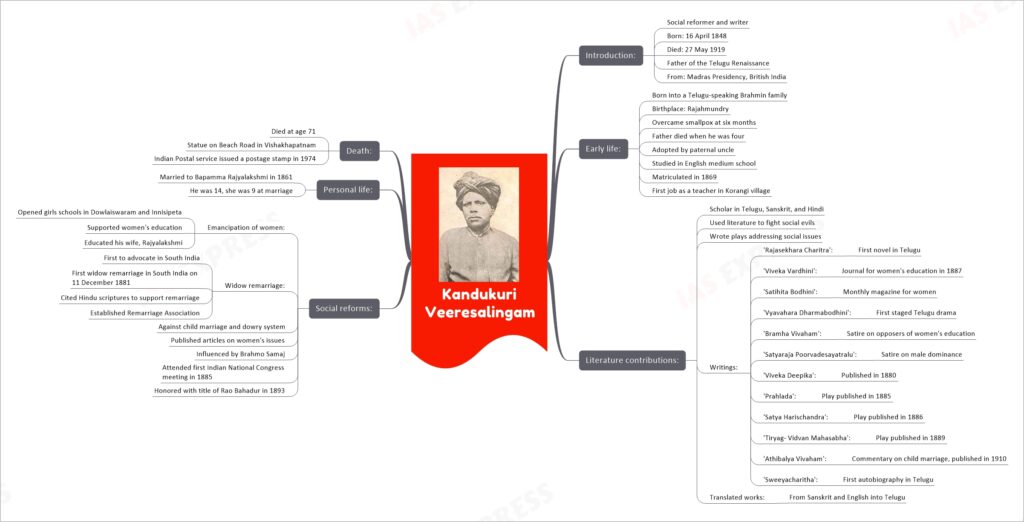Kandukuri Veeresalingam: The Father of Telugu Renaissance
Kandukuri Veeresalingam, a prominent social reformer and writer, played a pivotal role in shaping the course of Telugu society and culture. Born on 16 April 1848 in Rajahmundry, during the era of British India, his life was marked by relentless efforts to challenge and transform prevailing social norms. Veeresalingam’s contributions to literature and his unwavering commitment to social reform earned him the title of the “Father of the Telugu Renaissance.”
This topic of “Kandukuri Veeresalingam: The Father of Telugu Renaissance” is important from the perspective of the UPSC IAS Examination, which falls under General Studies Portion.
Early Life of Kandukuri Veeresalingam
- Telugu Brahmin Family: Veeresalingam was born into a Telugu-speaking Brahmin family, setting the stage for his profound impact on Telugu culture and language.
- Battle with Smallpox: At a mere six months of age, he faced a life-threatening battle with smallpox, emerging victorious against the odds.
- Orphaned at Four: Tragedy struck when Veeresalingam’s father passed away when he was just four years old, leaving him orphaned and vulnerable.
- Adoption: Fortunately, his paternal uncle stepped in and adopted him, providing him with the support and care needed for a brighter future.
- Education in English Medium: Veeresalingam’s education began in an English medium school, offering him exposure to modern education in addition to traditional learning.
- Matriculation in 1869: In 1869, he successfully matriculated, marking a significant milestone in his educational journey.
- Teaching Career: His first job as a teacher took him to Korangi village, where he would begin to impact the lives of others through education.
Literary Contributions of Kandukuri Veeresalingam
Kandukuri Veeresalingam was a scholarly figure with proficiency in Telugu, Sanskrit, and Hindi. His literary works served as a powerful tool to address and combat social evils:
- ‘Rajasekhara Charitra’: He authored the first novel in Telugu, ‘Rajasekhara Charitra,’ a groundbreaking literary achievement.
- ‘Viveka Vardhini’: In 1887, he established ‘Viveka Vardhini,’ a journal dedicated to women’s education, emphasizing his commitment to empowering women.
- ‘Satihita Bodhini’: Veeresalingam also founded ‘Satihita Bodhini,’ a monthly magazine focused on women’s issues, further promoting awareness and change.
- ‘Vyavahara Dharmabodhini’: His work extended to the realm of theater, with ‘Vyavahara Dharmabodhini’ being the first staged Telugu drama.
- ‘Bramha Vivaham’: He authored ‘Bramha Vivaham,’ a satirical work challenging those opposed to women’s education.
- ‘Satyaraja Poorvadesayatralu’: This work presented a satirical critique of male dominance in society.
- ‘Viveka Deepika’: Published in 1880, ‘Viveka Deepika’ added to his literary legacy.
- ‘Prahlada’: In 1885, ‘Prahlada,’ a play, showcased his versatility as a writer.
- ‘Satya Harischandra’: The year 1886 saw the publication of ‘Satya Harischandra,’ another significant play.
- ‘Tiryag- Vidvan Mahasabha’: In 1889, ‘Tiryag- Vidvan Mahasabha’ furthered his contributions to theater.
- ‘Athibalya Vivaham’: In 1910, he published ‘Athibalya Vivaham,’ a commentary challenging the practice of child marriage.
- ‘Sweeyacharitha’: Veeresalingam also penned ‘Sweeyacharitha,’ the first autobiography in Telugu.
Translated Works: In addition to his original writings, Veeresalingam translated works from Sanskrit and English into Telugu, expanding the literary horizons of the Telugu-speaking community.
Social Reforms by Kandukuri Veeresalingam
Veeresalingam’s commitment to social reform extended beyond the realm of literature. His efforts were instrumental in challenging and reshaping societal norms:
Emancipation of Women
- Girls’ Education: He opened girls’ schools in Dowlaiswaram and Innisipeta, advocating for women’s education.
- Educating His Wife: Veeresalingam himself educated his wife, Rajyalakshmi, setting an example for the empowerment of women.
- Widow Remarriage: He was the first advocate of widow remarriage in South India and facilitated the first such remarriage on 11 December 1881.
- Citing Hindu Scriptures: Veeresalingam used Hindu scriptures to support his stance on widow remarriage, challenging deeply ingrained societal norms.
- Remarriage Association: His efforts culminated in the establishment of the Remarriage Association, further promoting the cause.
- Against Child Marriage and Dowry: He vehemently opposed the practices of child marriage and the dowry system, advocating for their abolition.
- Published Articles: Veeresalingam used his writing skills to publish articles addressing various women’s issues, raising awareness and inspiring change.
- Influence of Brahmo Samaj: He was influenced by the Brahmo Samaj, a socio-religious reform movement, which shaped his views on social reform.
- Indian National Congress: In 1885, he attended the first Indian National Congress meeting, aligning himself with the broader struggle for Indian independence.
- Honored with Rao Bahadur: In recognition of his contributions, Veeresalingam was honored with the title of Rao Bahadur in 1893.
Personal Life and Legacy
- Marriage: Veeresalingam married Bapamma Rajyalakshmi in 1861 when he was 14 years old, and she was 9, reflecting the prevailing customs of the time.
- Passing Away: He passed away at the age of 71, leaving behind a legacy that would continue to inspire generations.
- Statue and Stamp: A statue in his honor stands on Beach Road in Vishakhapatnam, and the Indian Postal Service issued a postage stamp in his memory in 1974.
Conclusion
Kandukuri Veeresalingam’s multifaceted contributions in literature and social reforms profoundly impacted Telugu society and culture. His pioneering efforts in women’s education, advocacy for widow remarriage, and unwavering fight against social injustices laid the foundation for a progressive Andhra Pradesh. Veeresalingam’s legacy continues to serve as a beacon of hope and inspiration for those striving for a more equitable and just society.


